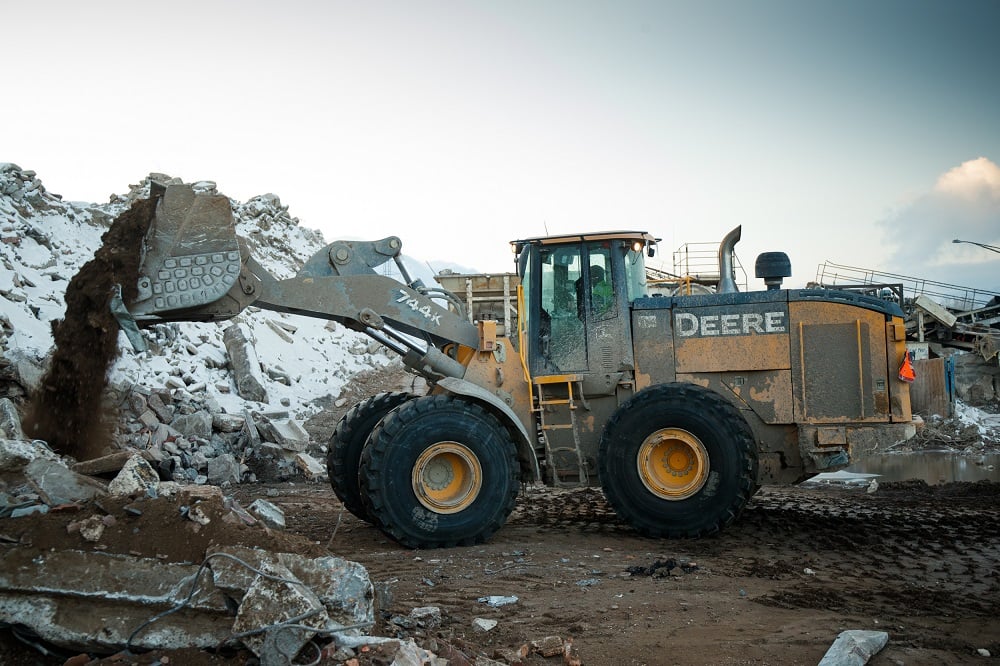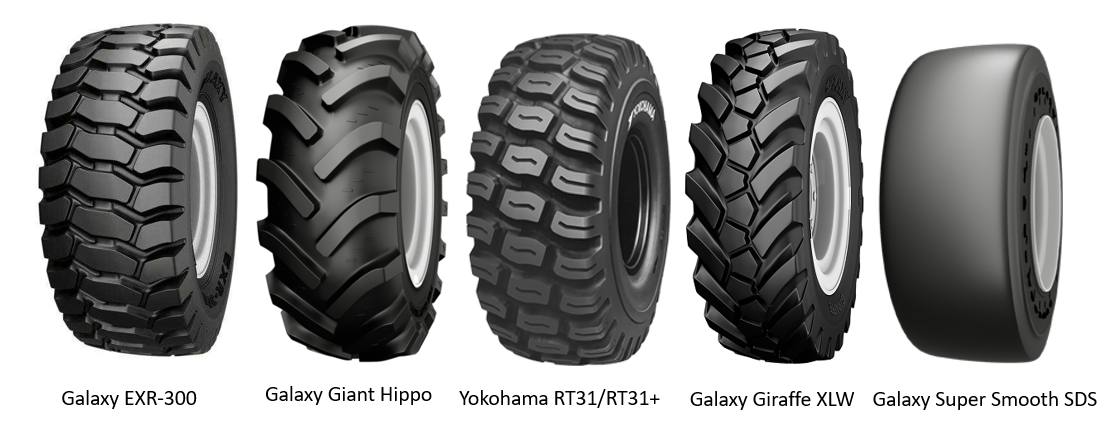What Factors to Consider When Selecting a Wheel Loader Tire
Wheel loaders, also commonly called front-end loaders and bucket loaders, are common in industries ranging from construction to material handling. Wheel loaders are tough on tires; on any given day, you’ll find them slamming into piles of gravel and soil, pivoting with heavy loads of rock or snow, traversing scrapyards and waste handling facilities, or enduring the dynamic forces of heavy buckets being raised and lowered.

Choosing an application-specific tire for your wheel loader, that is a tire matched to the task and terrain the machine operates in, can pay off. The “right” tire can increase service life, enhance productivity, improve performance, and prevent downtime—all of which adds up to a better bottom line.
Wheel Loader Size
One of the primary factors to consider when selecting a wheel loader tire is the size of the machine itself. There are three ways to view loader size—their gross weight, bucket capacity, and horsepower/torque—and as any of the three elements grow, so do the demands placed on the machine’s tires.
Wheel loader tires need to handle a load (both of the machine and what it’s carrying) and provide stability when a filled bucket is raised and lowered. They also must effectively transfer a wheel loader’s horsepower and torque to the ground and dissipate heat—the biggest enemy of tires. The ideal wheel loader tire will meet your machine’s needs without being over-spec'd, which is uneconomical, or under-spec’d, which is bound for trouble.
Application
The tasks you ask your wheel loader to perform and the type of conditions it operates in play a large role in the type of tire it requires. The surface it's working on and its condition, along with operating times, speeds traveled, and distances covered all affect which type of tire construction, tread type, and tread pattern is best. For example, a machine loading trucks at a quarry has different needs (cut and impact resistance) than a wheel loader moving materials around a large construction site (heat dissipation).
Construction: Bias, Radial, Solid
There are three main types of tires available for wheel loaders—bias, radial, and solid—all of which offer their own unique advantages.
- Bias tires are the traditional tire choice for wheel loaders, providing a smooth, stable ride and featuring thick sidewalls. This makes them a popular choice for applications where sidewall cuts and tears are a hazard.
- Radial tires are an increasingly common sight on wheel loaders. They provide more under tread cut and puncture resistance and deliver better traction and a more comfortable ride than bias tires. Radials also dissipate heat better than other types of wheel loader tires, making them the go-to choice for machines traveling at high speeds or over long distances.
- Solid tires, as their name implies, are made of solid rubber, which renders them impervious to punctures. Solid tires are best for applications where the threat of puncture is constant and for machines traveling short distances at slow speeds.
Tread Type
L-type tires are classified for use on wheeled loaders and dozers; these tires are designed to handle heavy loads, travel slow speeds over short distances, and prioritize stability. L-classified tires are accompanied by a numerical designation to indicate tread depth and application.
|
Tread Type |
Features |
|
L-2 |
Standard tread depth; designed to deliver maximum traction |
|
L-3 |
Standard tread depth; engineered for increased durability and enhanced resistance to scrapes and impacts |
|
L-4 |
150% deeper than the standard; constructed for applications in rocky terrain |
|
L-5 |
250% deeper than the standard; built for use in the toughest applications and most extreme conditions |
|
L-3S |
Standard depth and smooth tread |
|
L-4S |
150% deeper than standard smooth-treaded tires |
|
L-5S |
250% times deeper than standard smooth-treaded tires |
For optimal tire performance, it’s imperative to match the tread type—such as rocky terrain or extreme conditions—to the application your wheel loader is engaged in. For example, an L-2 tire is well-suited to a wheel loader used for landscaping and snow removal, while an L-4 or L-5 tire is optimal for mining and quarry work.
Tread Pattern
In addition to tread type, tread pattern can also influence the performance of your wheel loader tire. Wheel loaders come with five general tread patterns—swept, bar, block, hybrid, and smooth—each uniquely suited for particular applications.
- Swept lug patterns, like the one found on the Galaxy EXR-300, are outfitted with expansive, extra-wide lugs to deliver maximum traction and resist wear when working on hard surfaces.
- Bar lug patterns, like that of our Galaxy Giant Hippo, provide balanced performance, delivering long service life on hard surfaces but enough traction for navigating unimproved terrain like dirt construction sites.
- Block lug patterns, like the one found on the Yokohama RT31/RT31+, are the top choice for machines operating on soft surfaces. The blocks deliver numerous biting edges for digging in and delivering traction in everything from sand to mud.
- Hybrid lug patterns, like our Galaxy Giraffe XLW, feature a tread that combines the best qualities of bar and block patterns. Tires like the Giraffe XLW feature a blend of both the bar lug and block designs to provide a good grip on soft surfaces and long-lasting service on hard surfaces.
- Smooth treads, such as that found on our Galaxy Super Smooth SDS tires, don’t feature a pattern; rather, they’re distinguished by their lack of tread. Smooth tires excel on hard dry surfaces, where they deliver excellent traction, great durability, and long reliable performance.

Yokohama Off-Highway Tires Wheel Loaders Products
Whether it’s our Yokohama OTR, Galaxy, or Alliance brand, you’re sure to find a tire to meet the specific needs of your wheel loader. Our tires are designed to meet the real-world needs of our customers and we’re constantly working to deliver tires that outperform, last longer, and cost less over the life of the tire than our competition.
 Contact your local Yokohama Off-Highway Tires America, Inc. dealer or rep to learn more about our line of application-specific wheel loader tires.
Contact your local Yokohama Off-Highway Tires America, Inc. dealer or rep to learn more about our line of application-specific wheel loader tires.

